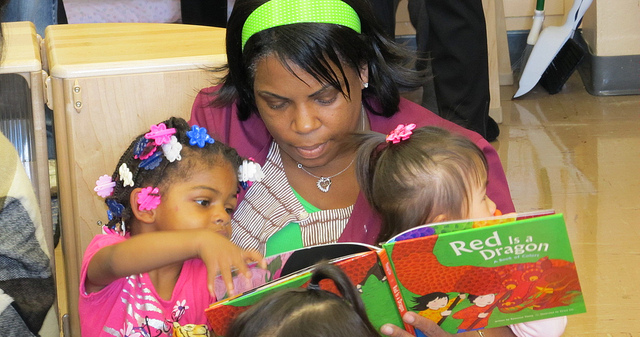Please support our coverage of democratic movements and become a supporter of rabble.ca.
Last week, the Vote Child Care 2015 campaign released its guide outlining the federal parties’ stands on key elements of a national child-care program. And there it was. The child-care workforce was “not referred to,” repeated four times across the chart. While this is the type of nuance typically left out of election platforms, it is one that will determine if and how a national child-care program will fundamentally change our country.
For tomorrow’s Day of Action for the Child Care Workforce (October 8, 2015), we highlight three points about the importance of fully valuing those working in child care. A more detailed analysis can be found in our recent article in the special issue of the Canadian Centre for Policy Alternative’s Our Schools/Our Selves.
The key to quality
Canadian and international research clearly show that high quality early childhood education and care (ECEC) depends above all else on a well-trained, well-compensated workforce. As well, developing and supporting a high-quality child-care workforce does not just happen. Like other elements of a high-quality system, a quality workforce requires intentional goals, plans, policy and funding.
It is plain that today’s reliance on a child-care market negatively affects the child-care workforce across Canada. The most recent survey of centre-based child care staff and directors, You Bet We Still Care!, consistent with previous surveys, found that “issues of compensation continue to be the aspect of the work that is least satisfying” and a main reason staff are leaving the field.
Although the survey showed increases in education levels and participation in professional learning, critical working conditions such as wages, paid time for planning and professional learning, and access to benefits saw minimal or no improvement. Recruitment and retention of educated staff was identified as an ongoing issue; a higher percentage of staff (compared to the last survey in 1998) were planning to leave their employment.
We know that low morale and persistent turnover pose major challenges to maintaining quality. Thus, to achieve high quality in a national child-care program, governments will need to build and fund a real system with mandated professional wages for staff and affordable fees for parents. This will require substantially increasing public funding — as wages make up an average 80 per cent of centre budgets even when kept low to maintain affordable parent fees.
Without this fundamental shift, the quality of child-care programs will remain precarious and the benefits of a national program will be compromised.
Investing in a high quality child care workforce is a good use of our public resources
Quality improvement strategies have resulted in a recent push across Canada to professionalize the child-care workforce, while the critical role that professional staff play in high quality ECEC is now acknowledged by provincial governments. The idea that early childhood educators have specialized knowledge and skills has gained recognition and counters perceptions that child care work is unskilled or simply an expression of the (mostly) female caregivers’ natural abilities.
Although there have been some positive developments as a result of the increased attention to professionalization, the contradictions between professional work and the reality of working in a child-care market continue to inhibit the intended results including hindering quality improvement.
Thus, although governments and the child-care sector may continue to pursue further education and new professional expectations, if the material realities including chronic low wages are not addressed, it is unrealistic to expect significant change.
The call to “make a difference” in the lives of young children has long been used to motivate child-care staff. But child-care staff also want to experience satisfying working lives and the mostly young women now entering the field are neither willing nor able to sacrifice their future livelihoods. Nor are they able to meet the needs of children and families in their care when their own basic needs are not being met.
Creating good jobs for women
It has been well documented that expanding child-care services has a significant impact on local and provincial economies while also supporting women (and men) who are parents to return to work or school. But further, as a labour intensive service with an almost entirely female workforce, child care also creates jobs for women. This means that creating good jobs in child care with decent pay, benefits and working conditions can make the benefits of a national child-care program twice as strong.
For governments concerned with closing the gender wage gap, a publicly funded child-care program is not optional but necessary for achieving this goal.
It is ironic that child care began as a women’s issue — an essential component of gender equality — yet as it is currently organized, perpetuates marginalization of the women performing this work in a paid capacity. A national child-care program with sustained funding and an intentional focus on quality through a well-compensated workforce can provide a real opportunity to address women’s equality on a number of fronts.
We welcome the attention that child care has received in this federal election and support the parties who call for making child care more affordable and accessible for families. But we argue that the child-care workforce needs to be considered front-and-centre if a national child-care program is going to fully contribute to a more prosperous, equal and fair Canada.
As a matter of gender justice and equality for all women and men in Canada, we not only join the call for a national child-care system but urge that the work of taking care of, and educating, young children come to be regarded as a public good that deserves our collective attention and resources.
Shani Halfon is a Registered Early Childhood Educator and the interim coordinator of the Association of Early Childhood Educators, Ontario
Rachel Langford is Director of the School of Early Childhood Studies at Ryerson University
TAGS
Please support our coverage of democratic movements and become a supporter of rabble.ca.



